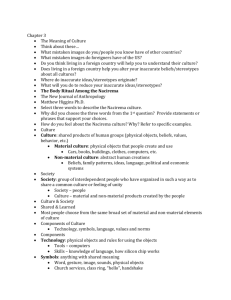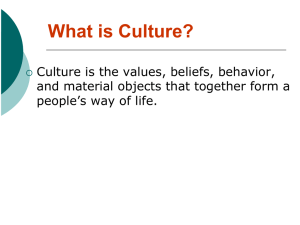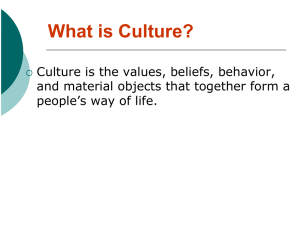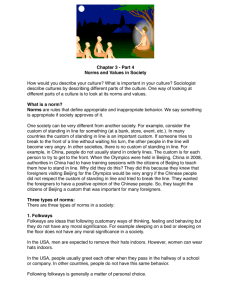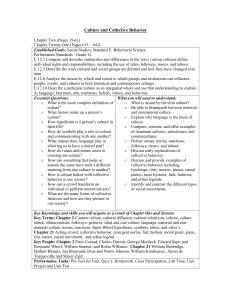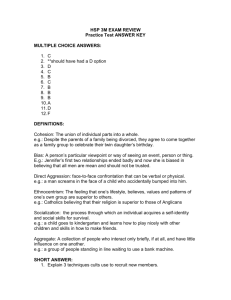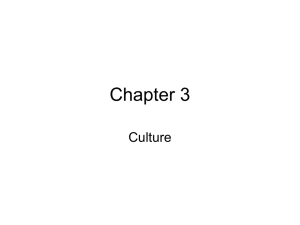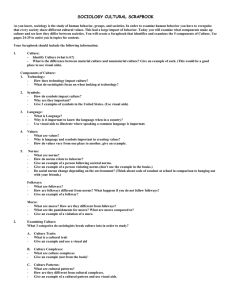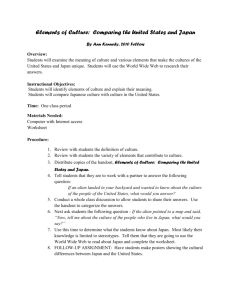·.·C·U·LTU.S·E
advertisement
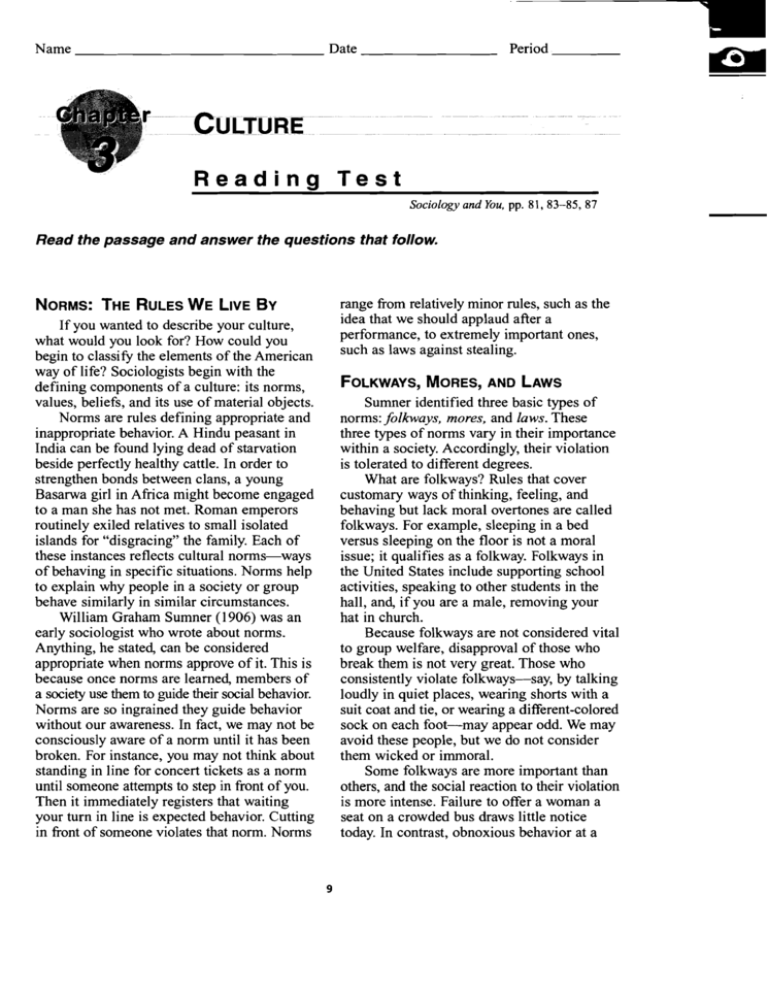
Name Date _ Period _ ·.·C·U·LTU.S·E Reading Test Sociology and You, pp. 81,83-85,87 Read the passage and answer the questions that follow. NORMS: THE RULES WE LIVE By range from relatively minor rules, such as the idea that we should applaud after a performance, to extremely important ones, such as laws against stealing. If you wanted to describe your culture, what would you look for? How could you begin to classify the elements of the American way of life? Sociologists begin with the defining components of a culture: its norms, values, beliefs, and its use of material objects. Norms are rules defining appropriate and inappropriate behavior. A Hindu peasant in India can be found lying dead of starvation beside perfectly healthy cattle. In order to strengthen bonds between clans, a young Basarwa girl in Africa might become engaged to a man she has not met. Roman emperors routinely exiled relatives to small isolated islands for "disgracing" the family. Each of these instances reflects cultural norms-ways of behaving in specific situations. Norms help to explain why people in a society or group behave similarly in similar circumstances. William Graham Sumner (1906) was an early sociologist who wrote about norms. Anything, he stated, can be considered appropriate when norms approve of it. This is because once norms are learned, members of a society use them to guide their social behavior. Norms are so ingrained they guide behavior without our awareness. In fact, we may not be consciously aware of a norm until it has been broken. For instance, you may not think about standing in line for concert tickets as a norm until someone attempts to step in front of you. Then it immediately registers that waiting your turn in line is expected behavior. Cutting in front of someone violates that norm. Norms FOLKWAYS, MORES, AND LAWS Sumner identified three basic types of norms: folkways, mores, and laws. These three types of norms vary in their importance within a society. Accordingly, their violation is tolerated to different degrees. What are folkways? Rules that cover customary ways of thinking, feeling, and behaving but lack moral overtones are called folkways. For example, sleeping in a bed versus sleeping on the floor is not a moral issue; it qualifies as a folkway. Folkways in the United States include supporting school activities, speaking to other students in the hall, and, if you are a male, removing your hat in church. Because folkways are not considered vital to group welfare, disapproval of those who break them is not very great. Those who consistently violate folkways-say, by talking loudly in quiet places, wearing shorts with a suit coat and tie, or wearing a different-colored sock on each foot-may appear odd. We may avoid these people, but we do not consider them wicked or immoral. Some folkways are more important than others, and the social reaction to their violation is more intense. Failure to offer a woman a seat on a crowded bus draws little notice today. In contrast, obnoxious behavior at a 9 Name Date _ Period _ •••••••••••••••••••••••••••••••••••••••••••••••••••••••••••••••••••••••••••••• party after excessive drinking may bring a strong negative reaction from others. What are mores? The term mores (pronounced "MOR-ays") is based on the word moral. Morality deals with conduct related to right and wrong. Mores are norms of great moral significance. They are vital to the well-being of a society. Conformity to mores draws strong social approval; violation of this type of norm brings strong disapproval. For example, Americans believe that able­ bodied men should work for a living. Able­ bodied men who do not work are scorned. Although following folkways is generally a matter of personal choice, conformity to mores is a social requirement. Still, some mores are more vital to a society than others. Failure to stand at attention while the national anthem is being played is not as serious a violation of American mores as using loud profanity during a religious service. The most serious mores are taboos. A taboo is a norm so strong that its violation demands punishment by the group (or, some people think even the supernatural). In India, followers of Hinduism have a taboo forbidding the killing of cows. Other taboos are related to sexual behaviors. Although definitions of incest vary from society to society, the incest taboo (forbidding sexual contact with close relatives) is generally regarded as the only taboo that is present in all societies. The "mother-in-law" taboo existing in some societies prohibits or severely restricts social contact between a husband and his wife's mother. How do laws differ from mores? The third type of norm is law. Laws are norms that are formally defined and enforced by officials. Folkways and mores emerge slowly and are often unconsciously created, while laws are consciously created and enforced. Mores are an important source for laws. At one time, the norm against murder was not written down. But as civilization advanced, the norm against murder became formally defined and enforced by public officials. Folkways can become mores or laws. Smoking, for example, was an acceptable behavior to most Americans until the late 1970s, when mounting health concerns convinced many that smoking should be limited or banned in public places. Today, many states have laws against smoking in airports, government buildings, restaurants, and other places open to the general public. Not all mores become law. For example, it is not against the law to cheat on an exam (although you may be suspended or punished by the teacher). Furthermore, not all laws started out as mores. Fines for overtime parking and laws against littering have never been mores. Laws often remain on the books for a long time after the mores of a society have changed. It is illegal in Minnesota to hang male and female undergarments on the same clothesline. New York prohibits card playing on trains; elephants in Natchez, Mississippi, cannot legally drink beer; and it is against the law to wear roller skates in public bathrooms in Portland, Oregon. 11. Cultural norms A. are high-society men named Norman. B. are medical practices approved by the FDA. C. are ways of behaving in certain situations. D. are found only in remote tribes that are unaffected by technology. 2. Which of the following is NOT a norm? A. personality B. folkway C. mores D. law 10 Name Date _ Period _ •••••••••••••••••••••••••••••••••••••••••••••••••••••••••••••••••••••••••••••• 3. What taboo is generally thought to be present in all societies? A. cannibalism B. dancing C. adultery D. incest 4. According to the text, which of the following is a folkway that eventually evolved into law? A. smoking limited in specific areas B. compulsory education C. cheating on an exam D. cutting in line 5. How do laws differ from folkways and mores? 6. The text mentioned an out-of-date law in Minnesota that forbade hanging men's and women's undergarments together on a clothesline. Make three observations on how society's mores concerning modesty and sexuality have changed over the last one hundred years, thus making this law seem humorous. 11
